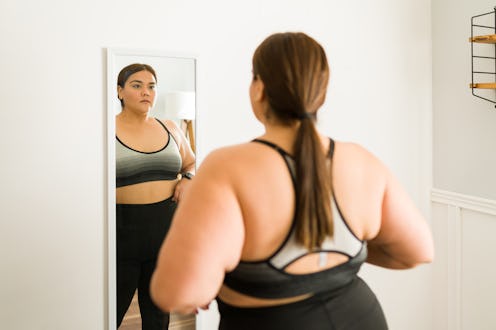
If you’re in a relationship, have there been instances where your partner has negatively commented on your weight? Do they occasionally (or more than occasionally) insult you in regard to your size or shape? Have they made jokes to you or others that are based on the appearance of your body? All of these scenarios fall under the definition of “body shaming.” According to Samantha DeCaro, Psy.D., the director of clinical outreach and education at eating disorder treatment facility The Renfrew Center, any comment that implies that your body needs to be “fixed” counts as body shaming, and this type of behavior can actually be classified as emotional abuse.
While everyone’s experience is different, body image is typically a very sensitive and personal topic. Societal expectations, the pressure to be seen as “attractive,” unrealistic beauty standards, and patriarchal elements all contribute to the ways in which people often view themselves and their bodies. Especially when it comes to women, the pervasive messages and expectations around their body size, shape, and overall appearance can influence their lifestyle choices — and even their well-being. So if your S.O. regularly criticizes your body or says things like, “You’d look so much better if you lost a few pounds,” your mental health is likely to be impacted. Read on for intel on body shaming in a relationship and how to deal if it’s happening to you.
Why Does My Partner Body Shame Me?
Although your partner might not intend to hurt your feelings, those behaviors are often rooted in negative experiences from someone’s childhood. “Body-shaming comments that a partner might make are often a reenactment of a similar comment that they have received in other chapters of their life,” says Dani Bryant, a clinical mental health counselor and body liberationist.
A partner can sometimes believe that they just care about your health, and justify their body shaming behavior as their way of nudging you to alter your lifestyle. But, as DeCaro explains, focusing on weight isn’t an accurate way to gauge someone’s health. “If you are truly concerned for your partner’s health, do not focus on weight,” she says. “There are many ways to improve health and engage in health-promoting behaviors without intentionally manipulating the shape or size of the body.”
Are Body-Shaming Comments Abusive?
Emotional abuse can sometimes start in small, gradual ways and is often difficult to spot in a relationship. Gaslighting, stonewalling, triangulation — each type can vary greatly in how they appear, but are all destructive nonetheless. Body shaming, in particular, can happen through any number of behaviors, according to Bryant. “Any sort of criticism, degradation, embarrassment, bullying, teasing, comments rooted in comparison, control, and unrealistic expectations are all body shaming,” she says. “It’s a denial of a whole person’s unique self, individuality, body diversity, and boundaries.”
While there is always a chance that your partner learned these behaviors or internalized shame about their own body in their early life, as Bryant mentioned, she also says that doesn’t disqualify it as a form of abuse. “It’s an opinion of someone else who has their own toxic shame that is often projected on others for power and control,” she says.
How Does Body Shaming Impact Mental Health?
There is no question that a partner hurling insults at you about your weight or size can hurt you deeply, and impact the strength and health of your relationship — not to mention the relationship you have with your body.
According to Bryant, experiencing emotional abuse in the form of body-shaming at the hands of a partner can dangerously impact your mental health, especially when it comes to your self-perception. “If we are told that our worth and value is in our body size, then we will continue to seek out and repeat the pattern until we understand that it is a pattern,” she says. Not only that, but if you have a history with an eating disorder of any kind, a partner who body shames you can definitely cause that to worsen, or even cause one to develop over time.
While it may be difficult, DeCaro encourages you to set boundaries with your partner if you find that they are body shaming you. “Express your feelings, communicate your needs, and tell them to stop,” she says, adding that you might also consider telling them that their comments are affecting how happy or safe you feel in the relationship. “Decide what you’re willing to do to take care of yourself if your partner continues to violate your boundaries,” she says.
If your partner’s abusive body-shaming comments have altered your body image and self-esteem, know that you do not have to allow your experience to be minimized — and that you deserve to be validated. Bryant says that everyone should be seen for their worth as a person rather than for their body. “If [your] partner cannot or will not do the work to try to understand where their own anti-fat biases or unrealistic beauty standards come from, then it's really important for folks to ask the question: How can I maintain any sort of growth or healing in body liberation if one of the closest people in my life is not doing that same work?”
If you or someone you know is experiencing domestic abuse, call 911 or the National Domestic Violence Hotline at 1-800-799-SAFE (7233) or visit thehotline.org.
Experts:
Dani Bryant, MS, LMHC, RDT, licensed clinical mental health counselor and body liberationist
Samantha DeCaro, Psy.D., director of clinical outreach and education at The Renfrew Center